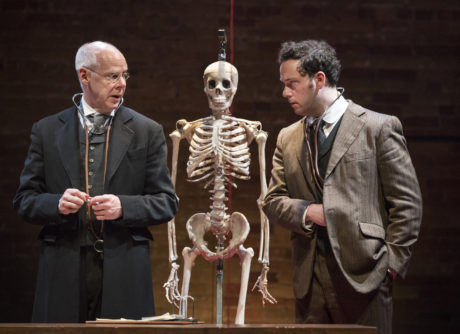The first-ever stage adaptation of W. Somerset Maugham’s Of Human Bondage, written by Vern Thiessen and directed by Albert Schultz for Canada’s Soulpepper Theatre Company, is also the recipient of the most Dora Awards (Toronto’s equivalent of the Tony Awards) in its city’s history, and with good reason. Now playing at the Pershing Square Signature Center as part of the “Soulpepper on 42nd Street” festival, the visiting production is ingenious in its staging, compelling in its message, and impeccable in its delivery.

Thiessen’s condensed version of Maugham’s epic semi-autobiographical novel of 1915 (which was previously adapted for the screen in three classic films) bypasses much of British protagonist Philip Carey’s extensive backstory (his childhood and the loss of his parents, his young-adult years in Germany and studying art in Paris), opening instead with a stunning scene of his enrollment in medical school back in England that eerily foreshadows the play’s incisive dissection of his psyche and the cutting choices he makes. It is immediately apparent that we are in for one inventive and riveting show.
There is, from the outset, a seamless synchronization of Soulpepper’s arresting artistic design with the characters’ actions and emotions. Dramatic lighting (by Lorenzo Savoini), expressive instrumentation and spot-on Foley sound effects (created by Sound Designer and Composer Mike Ross and performed by the ensemble), and an imaginative scenic design (also by Savoini) with movable furnishings, props, and pregnant picture frames (held, reflected in, and inhabited by the live actors) underscore the moods and signal the split-second transitions in time and locale, from scene to scene, in the fluid fast-paced narrative.

The characters represent a microcosm of humanity, embodying the uncontrolled passions – whether good or bad – that drive us and make us slaves to our emotions (Maugham’s title is a direct quote from the 17th-century Dutch philosopher Baruch Spinoza’s observations on human behavior in Ethics). They also raise questions about fate and destiny, reward and retribution, and how our individual decisions are the threads that come together to weave the tapestry of our lives. The entire cast succeeds in distinguishing the array of archetypal personalities, capturing their demeanors and accents (dialect coaching by Michael Armstrong), and defining their underlying motivations with acute insight and touches of sardonic humor.
Born with a club foot that has made him feel self-conscious and unworthy, torn between his love of art and his prospect for a more lucrative career in medicine, and obsessed with a “cold” and “vulgar” waitress who uses and abuses him, Gregory Prest’s Philip is at times frustratingly perplexing, laughably self-defeating, and heartbreakingly sympathetic, as he slowly learns and grows from his mistakes. In a fully three-dimensional performance, Prest makes us sense the pain of his limping gait, the hopelessness of his unrequited fixation, and the toll taken by his calamitous misjudgments, before he finally reaches, and is willing to accept, contentment. Michelle Monteith is downright detestable as the heartless and calculating waitress Mildred, taking advantage of Philip’s affection and financial support, playing with his emotions, then responding to him with disdain and destructiveness. At first flirtatious and rapacious, she becomes increasingly desperate and pathetic, and Monteith captures it all with full-out virulence.
The ten supporting actors, each playing multiple roles, are equally masterful in their interpretations of the contrasting personae in Philip’s life, all further defined by Erika Connor’s apropos period-style costumes. Unlike Mildred, Sarah Wilson’s Norah (jilted by him when Mildred makes an unexpected return) and Courtney Ch’ng Lancaster’s Sally (to whom he commits himself after his extended maturation process) are smart, self-reliant, sensitive, and caring. Oliver Dennis as the experienced Dr. Tyrell teaches his students dedication and empathy, and as the successful painter Lawson encourages Philip not to forsake his true passion for art. Their mutual friend Cronshaw, a reckless poet played with relish by Stuart Hughes, epitomizes the free-wheeling bohemian spirit, overindulging in absinthe at the expense of his own life, and convinced to the end that the only way to live is “to forget you’re going to die.” Paolo Santalucia as Dunsford and Jeff Lillico as Griffiths (Philip’s fellow medical students) show the evolution and devolution of their antithetical personalities, and John Jarvis skillfully switches from the unscrupulous stockbroker MacAlister to Philip’s welcoming former patient Thorpe Athelney. Rounding out the outstanding ensemble are Raquel Duffy, Richard Lam, and Brendan Wall, each contributing to the overall quality of the stellar production.
Soulpepper’s superb re-envisioning of Maugham’s masterpiece is an impressive summer treat for New York audiences, a fully integrated and thoroughly captivating example of the best of experimental theater. See Of Human Bondage while it’s here, and you’ll also see why it deserved every one of the awards it received in Toronto.
Running Time: Approximately two hours and 35 minutes, including a 20-minute intermission.

Of Human Bondage plays through Wednesday, July 26, 2017, at Soulpepper on 42nd Street, performing at the Pershing Square Signature Center – 480 West 42nd Street, NYC. For tickets, call (888) 898-1188, or purchase them online.




